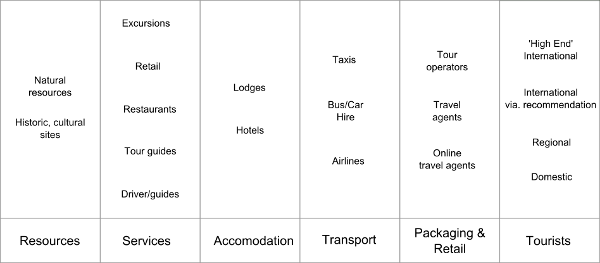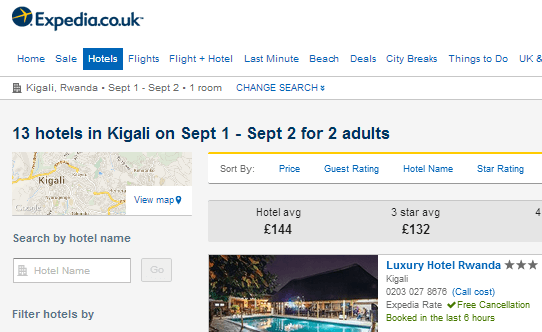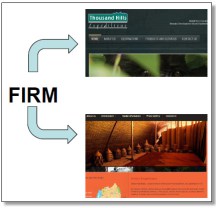19 Oct 2014
This is the second part of a three part series that discusses the outcomes of recent outreach meetings in Rwanda for our ESRC/DFID-funded project on changing internet connectivity in East Africa (part 1, part 3).
In this article Chris Foster (OII) and Claude Migisha K (ICT4D consultant) discuss the outcomes of an outreach meeting in the tourism sector.
Here is @cgfoz leading today’s workshop on ICT & Tourism in Rwanda (http://t.co/RXYnOUmYw9) We’ll share reports soon pic.twitter.com/HBK8H8qrzB
— Mark Graham (@geoplace) August 21, 2014
Broadband and ICTs can contribute to economic growth and help improve delivery in many sectors. Tourism is a growing service sector in Rwanda, frequently targeting foreign customers, so we wanted to explore how relevant new connectivity has been to firms positioning in the global market.
Globally, ICTs and the internet are transforming tourism, and in Rwanda virtually all firms in the tourism sector use ICT in some form. However, successful use of specific technologies were often only undertaken by one of two firms in the sector. This workshop was set up as an interactive session to allow some of these successful practices to be shared, which could lead to wider improvement.
The workshop was organised in hand with the Rwanda Tourism Chamber – an umbrella association for all private companies in tourism-related business and the Rwanda Development Board (RDB) – Tourism department. The session was introduced by Telesphore Ngoga, Community Conservation and Development Manager, RDB and attended by hotel managers, tour operators, travel agents, tourism destination managers and policy makers.
1) Using internet to improve operations
The tourism sector in Rwanda includes a range of firms (see below) and activity often involves firms bundling tourism services, and organisation of these services. In the meeting we discussed how we found that the internet is being used to help firms improve their organisation and internal planning, reducing time spent on management and internal communications.

Firms linked to the Rwandan tourism sector.
Firms towards the right of the image may bundle together services towards the left for tourists
However, online interaction is frequently email-based with lower use of information systems and online services amongst smaller firms.
We did find interesting use of ICT apps and online services, but this was not widespread. Interesting use of apps and services we found included some Rwandan tour operators using Dropbox to share high bandwidth multimedia with international tour firms, improving their presentation of tour itineraries. Some hotels and guest houses were also adopting online booking systems such as Expedia, Hotels.com and Airbnb which simplify payment from customers.

A growing number of hotels are using online services such as Expedia to increase bookings. They also allow more simplified payments from customers improving operations.
There is still work to do though. For instance, we identified coherent internal information systems and skilled management as crucial to more dynamic firms in the tourism sector. In many firms a lack of internal systems and clear management meant that connectivity was not being best exploited
2) Using internet to reach customers
Websites and social media
There is a tendency for tourism firms in Rwanda to outsource online websites and social media to external web firms, for which they are often overcharged. In this meeting, successful firms stressed that it is crucial that content writing and updating are kept in-house to ensure that firms keep control of online resources.
A number of questions in the workshop were also posed around how best to manage and promote websites (and ultimately attract customers). For instance, new online platforms and using SEO (Search Engine Optimization) to attract more clients were two areas mentioned as areas of low knowledge.
successful firms stressed that it is crucial that content writing and updating are kept in-house to ensure that firms keep control of online resources.
Social media use in Rwandan firms was also an area of discussion. In our research we found that sometimes social media is seen by managers as a time-sink with unclear benefits. Yet, it is an increasingly important online resource – in how customers find, share and decide on tourism experiences. For those directly involved in social media, key issues discussed in the meeting included how to deal with bad reviews and what types of information are best to present on social media.
Markets and branding
Going online is often not a matter of reaching ‘more of the same’ customers. Firms in Rwanda who have been successful have been those who have reached specific demographics or targeted segments of customer online.

Some tour firms in Rwanda have undertaken online market segmentation strategies, using variable online branding to reach different customer demographics
There were successful cases of firms who strategically push into niche areas (i.e bird watching, community tourism, and regional customers) and were successful. In discussions it was felt that online activities are a key element of marketing and branding approaches – in looking for niches, and ensuring that niches reach a critical mass of customers.
Conclusion
In conclusion, our key research findings in the wider project were echoed in this meeting. Many firms in tourism have adopted and are actively using digital connectivity. But, digital connectivity alone has not lead to transformation. Rather, one can see a set of wider barriers to transformation.
digital connectivity alone has not lead to transformation. Rather, one can see a set of wider barriers
Barriers can relate to skills in using available technologies within businesses. Online resources and services were also found to be difficult to integrate effectively and this can limit viability. Finally, existing firms may already be in well-established relationships with international tour firms which can make it difficult for new firms to grow to significant scale.
Some firms have resources to overcome barriers and feel the transformational benefits of connectivity, but many others are still searching for best use of connectivity. The goal should be to tackle these barriers to effective use of connectivity to drive improved benefits.
We released a short summary report on Rwandan Tourism sector and connectivity as part of this meeting which is available here. We will also be releasing a comprehensive report in late October that summarises this research.
We would like to thank those who attended the session and contributed to the lively discussions. We would also like to thank the Rwandan Tourism Chambers and RDB for their support in hosting this session.